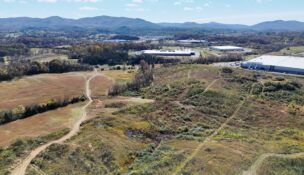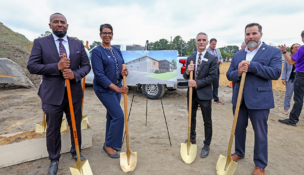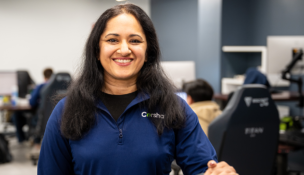Tech talent factory
Virginia Tech’s Innovation Campus will partner with industry to create tomorrow’s tech workforce
Tech talent factory
Virginia Tech’s Innovation Campus will partner with industry to create tomorrow’s tech workforce
Lance R. Collins was hired to lead Virginia Tech’s $1 billion Innovation Campus in one world, but he begins work Aug. 1 in another.
But the Innovation Campus’ new vice president and executive director sees the disruption fueled by the pandemic and recession as only sharpening the mission of Tech’s initiative to create a tech talent pipeline in Northern Virginia.
“This has really upped the ante considerably,” says Collins, who previously worked as Cornell University’s engineering dean for a decade.
“With disruption comes innovation,” says Tech’s associate vice president for innovation and partnerships, Brandy Salmon, who has been managing director of the project. “This campus and our mission are ever more important.”
An analysis by the Greater Washington Partnership reinforces that view, says Russ Ramsey, chair of the partnership and of Capital CoLAB, an initiative promoting collaboration among the region’s universities and businesses.
Taking into account the pandemic’s economic fallout, the research foresees a 50% tech talent supply gap by 2025, says Ramsey, chair and co-founder of Ramsey Asset Management.
Tech’s campus represents “a major opportunity for the capital region to narrow our digital tech supply gaps and drive inclusive growth,” he says.
Groundbreaking on Tech’s first building in Alexandria’s North Potomac Yard is still a year away, but the Innovation Campus will launch its inaugural fall semester at Tech’s existing academic space in Falls Church on Aug. 24. (Tech said in June it plans to expand and redevelop its Northern Virginia Center in Falls Church, which, as of August, no longer shares space with the University of Virginia.)
Amid some pandemic-related uncertainty, between 125 to 150 students are expected to enroll in four master’s programs in computer science and computer engineering. By 2028, the number will rise to about 750 master’s students, plus Ph.D. candidates, postdoctoral associates and undergraduates taking part in experiential learning programs.
Students will be taught by faculty working alongside industry partners, Collins says, to bring the “experience aspect of technology alongside the fundamentals” taught in the classroom.
“We will build an education that integrates corporate America onto the campus in ways that you don’t see in a traditional campus,” he says.
Forging bonds with industry
The graduate campus will be located near Amazon.com Inc.’s HQ2 East Coast headquarters campus in Arlington — the prime reason behind the Innovation Campus’ creation.
But Collins says the Innovation Campus will not work exclusively with any one company.
“We want to educate students and have those students have options wherever they go,” he says. “We’re not hard-lining anybody into anything. They will choose to follow whatever they feel is their best career path forward.”
Technology is driven by the private sector, so integrating the two gives students the chance to work on relevant problems, Collins says, and understand where industry is headed.
“It’s the nature of the beast that proximity is reinforcing,” he says.
Collins doesn’t see a conflict with academia being closely entwined with industry.
Silicon Valley, he points out, became what it is because of relationships forged between tech companies and the talent pool provided by higher education institutions like Stanford, Berkeley and Cal Tech.
Northern Virginia has the opportunity to be even more influential because of the region’s federal policymakers, he says.
“The pace with which technology advances is just skyrocketing. That creates real challenges,” he says. “It’s almost like technology can zoom ahead of our ability to completely understand all of the impact.”
“Because of all of the interconnects that are in one location,” the Northern Virginia tech sector has the opportunity to help sort out the complex relationship between laws and technology, Collins adds.
‘A time of technology’
In the Washington region, engineers already are having their moment in higher education. Two of Collins’ friends, Gregory Washington and Darryll J. Pines, became the presidents of George Mason University and the University of Maryland, respectively, in July.
Collins says it’s “an interesting convergence” for three African American engineers to move into leadership positions.
“Historically, that’s relatively rare to see engineering people moving into presidential roles,” he says. “But I think it’s appropriate. I think this is a time of technology like we’ve never seen before.”
Though Collins expects there will be opportunities for collaboration in the future, for now he’s concentrating on “bootstrapping” a new campus.
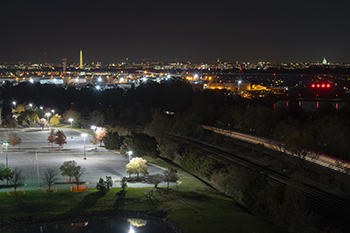
Tech’s 300,000-square-foot academic building is scheduled to open in 2024.
The four-acre campus will anchor the first phase of Alexandria’s North Potomac Yard Innovation District in National Landing on approximately 15 acres.
Phase One plans call for a mixed-use district that will include six other residential, retail and office buildings, open spaces, a public park and a new Metrorail station. It will be built on the site of a Regal Cinemas multiplex on Potomac Avenue that closed during the pandemic.
The overall development by Lionstone Investments and JBG Smith eventually will encompass about 65 acres.
The Tech academic building, with a price tag of $275 million, is being designed by the architecture and planning firm SmithGroup, based in Detroit.
The geometric design features a glass and metal façade with terraces that connect to green space. It will be sculpted to maximize power generated from photovoltaics in the glass of the façade and from a solar array on the roof. In a nod to the Blacksburg campus, the dolomite limestone known as Hokie Stone will be incorporated into the construction.
Another 250,000 square feet of partner space, the Innovation Building, is expected to open at the same time to provide space for startups and corporate facilities.
The Virginia Tech Foundation will lease space from the developer and then sublease up to 75,000 square feet to Tech or other partners, according to Michael Stowe, Tech’s media relations director. Tech has no other financial commitments to the building, he says.
Stowe says the timeline for building two additional academic buildings planned for the campus will be determined by growth in the programs.
The inaugural class of students and faculty will work from the Falls Church location, following public health guidance on whether classes should be held online, in person or in a hybrid format.
Collins’ primary office will be in Alexandria in leased space in the National Industries for the Blind building on Potomac Avenue, adjacent to the Innovation Campus’ future location. The space will house the campus’ executive offices and a café-style area for student work groups, seminars and community engagement.
A pipeline loop
For the next two academic years, the university is offering grants of $3,000 or $5,000 per semester to Virginia residents enrolled in its computer science or computer engineering master’s programs in Blacksburg or Northern Virginia.
On the Blacksburg campus, Virginia Tech plans to increase undergraduate enrollment by 2,000 students in computer science and related disciplines to help meet the state’s tech needs.
Tech draws nearly a third of its undergraduates from Northern Virginia, and Collins sees Blacksburg as a pipeline to the Innovation Campus.
“You can almost think of it as a loop,” he says of undergraduates in Blacksburg who will return home to further their education on the new campus and then join a tech company.
“There’s really a very exciting future for them when they finish their studies,” he says.
Brandy Salmon, who has led the team responsible for developing the campus plan, says the hiring of Collins was “a fantastic milestone” in that work. “He is bringing so much with him,” she says.
She notes that he had a seminal role in the establishment of Cornell Tech on Roosevelt Island in New York City, which she says is “one of the closest parallel projects” to what the Innovation Campus is trying to achieve.
There are similarities but also differences, as Tech plans “to leverage our unique environment in this point and time in the world,” she says.
The COVID-19 pandemic that abruptly forced workplaces and classrooms online has underscored the importance of research into topics ranging from artificial intelligence to cyberphysical systems.
“Those kinds of key issues of the digital tech sector were already in our plans and are now more relevant than ever,” she says.
In addition to her role with the campus project, Salmon leads a complementary effort called LINK+LICENSE+LAUNCH, which she describes as “the gateway for industry partners into the university.” Her team works with companies to commercialize technology and research while managing the intellectual assets of the university.
“We believe that the Innovation Campus is a great opportunity to do that work at scale in a really important place in the world and with really important partners,” she says, adding that the goal will be to produce skilled students for industry partners. “We have baked industry needs and their priorities into everything that we’ve done.”
Salmon gives credit to Amazon as the catalyst for “this investment in higher ed. They helped encourage an ecosystem of industry in Seattle, and we’d love to think about that same tech sector ecosystem coming online in this region,” she says.
Collins expects other universities will emulate the satellite tech campus concept because urban areas in need of tech talent aren’t always near flagship institutions.
“Technology is just a huge growth sector of the economy, and it’s all about having talented people to drive that growth,” he says. “Where do you go for talented people? You go to universities.”
VIRGINIA TECH INNOVATION CAMPUS
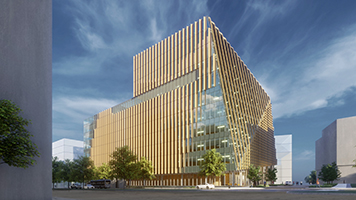
Purpose: Virginia Tech’s $1 billion Alexandria campus will partner with local industry to create a skilled workforce for tech companies as part of Virginia’s successful bid to bring Amazon HQ2 to Northern Virginia.
The campus: The Innovation Campus’ 300,000-square-foot, $275 million academic building is scheduled to open in 2024. Opening at the same time will be 250,000 square feet of partner space for startups and corporate facilities. Four master’s programs in computer science and computer engineering are expected to enroll 750 students, to be taught by 50 research faculty, by 2028.
Location: The campus will be located in an approximately 15-acre mixed-use development in Alexandria in the National Landing Innovation District in North Potomac Yard, about two miles from Amazon’s HQ2 headquarters in Arlington. The first phase will include residential, retail and office facilities, plus open space. The project will be part of an overall 65-acre development from Lionstone Investments and JBG Smith.

LANCE R. COLLINS
Position: Inaugural vice president and executive director of Virginia Tech Innovation Campus
Former position: Joseph Silbert Dean of Engineering at Cornell University for past decade
Achievements: Part of the leadership team that successfully bid to partner with New York City to build Cornell Tech, which opened on the Roosevelt Island campus in 2017. Honored with Mosaic Medal of Distinction for work to increase diversity in engineering, including more than doubling the proportion of underrepresented minority students and increasing undergraduate female enrollment to more than twice the national average.
Education: Bachelor’s degree in chemical engineering, Princeton University, 1981; master’s and Ph.D. in chemical engineering, University of Pennsylvania, 1983 and 1987
a




